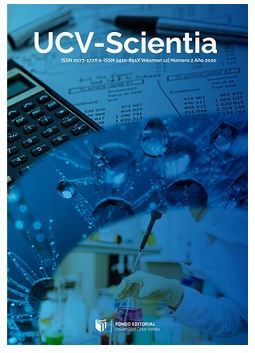Psychological Impact for the COVID-19 Pandemic on Health Professionals of the province of Cañete-Perú
DOI:
https://doi.org/10.18050/ucvs.v.13i1.02Keywords:
Coronavirus; Pandemic; Depression; Anxiety; Stress; Mental healthAbstract
The psychological impact is one of the most important events in the mental health of the population, although in health professionals, the situation puts not only their mental health at risk, but also a poor quality of care for patients, that is why this research work has as objective to determine the psychological impact of the COVID-19 pandemic on health professionals. It is a study with a quantitative, descriptive, cross-sectional and non-experimental approach, with a total population of 192 health professionals, who responded to a digital survey of sociodemographic data and the data collection instrument Depression, Anxiety and Stress (DASS-21) . In the results, we observe that 115 (59.9%) of health professionals have a low psychological impact, 16 (8.3%) have a medium psychological impact and 61 (31.8%) have a high psychological impact. In conclusion, the promotion and prevention of mental health should be taken into account in health professionals during the care of COVID-19 patients, since it will allow the professional to remain adequately stable and it can reduce the symptoms of depression, anxiety and stress.
References
Addis, S. G., Nega, A. D., & Miretu, D. G. (2021). Psychological impact of COVID-19 pandemic on chronic disease patients in Dessie town government and private hospitals, Northeast Ethiopia. Diabetes and Metabolic Syndrome: Clinical Research and Reviews, 15(1), 129–135. https://doi.org/10.1016/j.dsx.2020.12.019
de salud y en la población general de China. Revista de Neuro-Psiquiatria, 83(1), 51–56. https://doi.org/10.20453/rnp.v83i1.3687
Nguépy, F., Mboua, P., Djifack, T., Fokouong, E., Tasson, C., Ide, J., Noupoue, E., Tsoplifack, C., & Folefack, G. (2021). Psychological distress among health care professionals of the three COVID-19 most affected Regions in Cameroon: Prevalence and associated factors. Annales Medico-Psychologiques, May. https://doi.org/10.1016/j.amp.2020.08.012
Sánchez, J., Tovilla, C., González, D., & González, T. (2020). Riesgo de sindemia de COVID-19 y fiebre del dengue en el sur de México. Gaceta Medica de Mexico, 156(5), 469–473. https://doi.org/10.24875/GMM.20000473
Santamaría, M., Etxebarria, N., Rodriguez, I., Albondiga, J., & Gorrochategui, M. (2020). Impacto psicológico del COVID-19 en una muestra de profesionales sanitarios españoles. Revista de Psiquiatría y Salud Mental, 1–13. https://doi.org/10.1016/j.rpsm.2020.05.004
Tengilimoğlu, D., Zekioğlu, A., Tosun, N., Işık, O., & Tengilimoğlu, O. (2021). Impacts of COVID-19 pandemic period on depression, anxiety and stress levels of the healthcare employees in Turkey. Legal Medicine, 48, 101811. https://doi.org/10.1016/j.legalmed.2020.101811
Tran, T., Tran, T., & Fisher, J. (2013). Validation of the depression anxiety stress scales (DASS) 21 as a screening instrument for depression and anxiety in a rural community-based cohort of northern Vietnamese women. BMC Psychiatry, 13(1), 1. https://doi.org/10.1186/1471-244X-13-24
Wang, X., Hegde, S., Son, C., Keller, B., Smith, A., & Sasangohar, F. (2020). Investigating mental health of US college students during the COVID-19 pandemic: Cross-sectional survey study. Journal of Medical Internet Research, 22(9). https://doi.org/10.2196/22817
Werner, E., Aloisio, C., Butler, A., D’Antonio, K., Kenny, J., Mitchell, A., Ona, S., & Monk, C. (2020). Addressing mental health in patients and providers during the COVID-19 pandemic. Seminars in Perinatology, 44(7), 151279. https://doi.org/10.1016/j.semperi.2020.151279
Xiao, X., Zhu, X., Fu, S., Hu, Y., Li, X., & Xiao, J. (2020). Psychological impact of healthcare workers in China during COVID-19 pneumonia epidemic: a multi-center cross-sectional survey investigation. Journal of Affective Disorders, 274, 405–410. https://doi.org/10.1016/j.jad.2020.05.081
Downloads
Published
How to Cite
Issue
Section
License

This work is licensed under a Creative Commons Attribution-NonCommercial 4.0 International License.
- Share — copy and redistribute the material in any medium or format
- Adapt — remix, transform, and build upon the material.
- The licensor cannot revoke these freedoms as long as you follow the license terms.
Under the following terms:
-
Attribution — You must give appropriate credit, provide a link to the license, and indicate if changes were made. You may do so in any reasonable manner, but not in any way that suggests the licensor endorses you or your use.
- No additional restrictions — You may not apply legal terms or technological measures that legally restrict others from doing anything the license permits.













